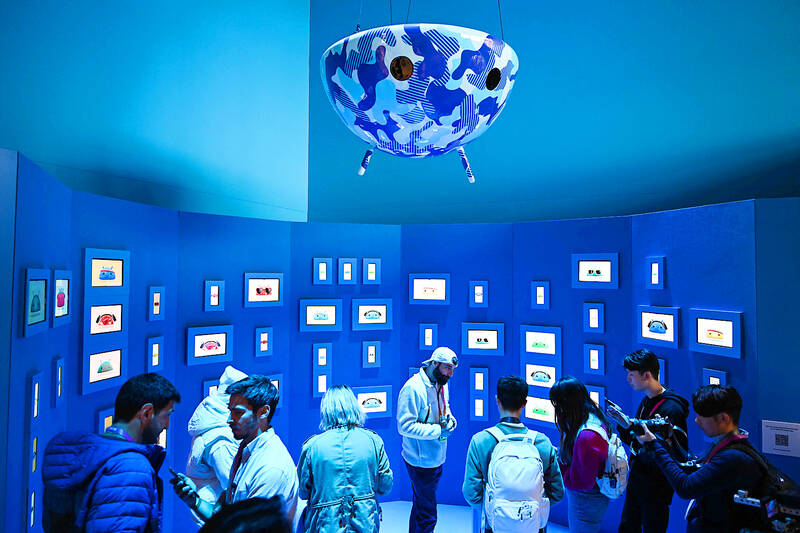Alphabet Inc chief executive officer Sundar Pichai told employees on Monday that job cuts were made in a bid to act decisively as Google’s growth slowed.
In an internal meeting, Pichai said he had consulted with the company’s founders and board in making the decision for 6 percent cuts, according to remarks reviewed by Bloomberg.
“If you don’t act clearly and decisively and early, we can compound the problem and make it much worse,” Pichai said. “These are decisions I needed to make.”

Photo: AFP
Google said on Friday that it would eliminate about 12,000 jobs, becoming the latest tech giant to retrench after years of abundant growth and hiring. Although speculation about the cuts had swirled for months, the layoffs were nonetheless a shock to the system for some employees. Some realized they lost their jobs when they were unable to access corporate systems. Yet Pichai stressed the cuts were the product of careful consideration.
“The process was far from random,” he said. He added that because bonuses were tied to company performance, and because leadership needs to be accountable, all senior vice presidents and above would see a “significant reduction” in their annual bonus this year.
The size of Google’s workforce forced executives to keep the circle of decision makers relatively small, Google chief people officer Fiona Cicconi said in the meeting with employees.
“In an ideal world, we would have given managers a heads-up, but we have over 30,000 managers at Google,” Cicconi said. “We wanted to give certainty sooner.”
Another executive said severance packages had been structured to reward workers with long tenures at the company.
Alphabet chief financial officer Ruth Porat stressed in the meeting that the cuts were intended to free the company up to continue investing in key priorities.
“Act early, and you then create the capacity to invest for long-term growth,” Porat said. “As difficult as this was, those were the takeaways.”
Separately, the US Department of Justice is poised to sue Google as soon as this week regarding the search giant’s dominance over the digital advertising market, according to people familiar with the matter.
The case is expected to be filed in federal court before the end of the week, the people said.
The Justice Department did not immediately respond to a request for comment. Google declined to comment.
The lawsuit will mark the Justice Department’s second monopoly case against the company, which is the No. 1 player in the US$278.6 billion US digital-ad market, controlling most of the technology used to buy, sell and serve online advertising.
The lawsuit would also be the fifth major case in the US challenging the company’s business practices.
State attorneys general have filed three separate suits against Google, alleging it dominates the markets for online search, advertising technology and apps on the Android mobile platform in violation of antitrust laws.

PATENTS: MediaTek Inc said it would not comment on ongoing legal cases, but does not expect the legal action by Huawei to affect its business operations Smartphone integrated chips designer MediaTek Inc (聯發科) on Friday said that a lawsuit filed by Chinese smartphone brand Huawei Technologies Co (華為) over alleged patent infringements would have little impact on its operations. In an announcement posted on the Taiwan Stock Exchange, MediaTek said that it would not comment on an ongoing legal case. However, the company said that Huawei’s legal action would have little impact on its operations. MediaTek’s statement came after China-based PRIP Research said on Thursday that Huawei filed a lawsuit with a Chinese district court claiming that MediaTek infringed on its patents. The infringement mentioned in the lawsuit likely involved

Taipei is today suspending work, classes and its US$2.4 trillion stock market as Typhoon Gaemi approaches Taiwan with strong winds and heavy rain. The nation is not conducting securities, currency or fixed income trading, statements from its stock and currency exchanges said. Authorities had yesterday issued a warning that the storm could affect people on land and canceled some ship crossings and domestic flights. Taiwan Semiconductor Manufacturing Co (TSMC, 台積電) expects its local chipmaking fabs to maintain normal production, the company said in an e-mailed statement. The main chipmaker for Apple Inc and Nvidia Corp said it has activated routine typhoon alert

GROWTH: TSMC increased its projected revenue growth for this year to more than 25 percent, citing stronger-than-expected demand for AI devices and smartphones The Taiwan Institute of Economic Research (TIER, 台灣經濟研究院) yesterday raised its forecast for Taiwan’s GDP growth this year from 3.29 percent to 3.85 percent, as exports and private investment recovered faster than it predicted three months ago. The Taipei-based think tank also expects that Taiwan would see a 8.19 percent increase in exports this year, better than the 7.55 percent it projected in April, as US technology giants spent more money on artificial intelligence (AI) infrastructure and development. “There will be more AI servers going forward, but it remains to be seen if the momentum would extend to personal computers, smartphones and

Catastrophic computer outages caused by a software update from one company have once again exposed the dangers of global technological dependence on a handful of players, experts said on Friday. A flawed update sent out by the little-known security firm CrowdStrike Holdings Inc brought airlines, TV stations and myriad other aspects of daily life to a standstill. The outages affected companies or individuals that use CrowdStrike on the Microsoft Inc’s Windows platform. When they applied the update, the incompatible software crashed computers into a frozen state known as the “blue screen of death.” “Today CrowdStrike has become a household name, but not in